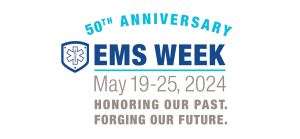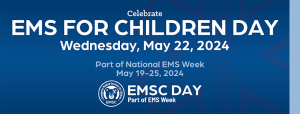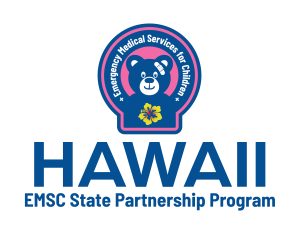Emergency Medical Services for Children (EMSC)
Let’s Celebrate EMS Week and EMSC Day!
 Each year, National EMS Week recognizes and thanks EMS clinicians for their life-saving work on the frontlines of our health care system. This year’s theme for National EMS Week is “Honoring our past. Forging our future”.
Each year, National EMS Week recognizes and thanks EMS clinicians for their life-saving work on the frontlines of our health care system. This year’s theme for National EMS Week is “Honoring our past. Forging our future”.
Mahalo to our EMS providers in Hawaii for the important work you all do every day!
-
Thank you Templates
-
Coloring sheets/books
When it comes to injuries and illness, children are not “little adults”. Treatment of injured and ill children requires specific skills and types of emergency care equipment and supplies for proper assessment and emergency care. The Emergency Medical Services for Children (EMSC) is a national initiative administered by the U.S. Department of Health and Human Services’ Health Resources and Services Administration (HRSA) and the Maternal and Child Health Bureau (MCHB). Its focus is to reduce child and youth disability and death due to severe illness and injury by ensuring access to high quality emergency medical care for all children everywhere in the United States. It is the only federal grant program that specifically focuses on addressing the needs of children in prehospital and hospital emergency medical systems, and has provided grant funding to all 50 states, the District of Columbia, and five U.S. territories since its establishment in 1985.
The program develops partnerships across the continuum of emergency care and provides special programs and training opportunities, all with the aim of: ensuring that state-of-the-art emergency medical care for ill or injured children and adolescents is available when needed; ensuring that pediatric services are well integrated into the existing state emergency medical services (EMS) system and backed by optimal resources; and ensuring that the entire spectrum of emergency services, including primary prevention of illness and injury, acute care, and rehabilitation, is provided to children and adolescents at the same level as adults.
EMSC State Partnership (SP) Program
The EMSC State Partnership Program is a statewide collaborative project under EMSC that provides funds to states to assist in improving the pediatric component of their EMS system. Its mission is to ensure effective pediatric emergency care according to best practice standards statewide through expanding and improving the state’s capacity. State governments and accredited schools of medicine in states are eligible for the grants, which can award up to $205,000 per year, for a 4-year grant period (current grant period April 2023–April 2027).
BEFAST – Signs and Symptoms of Stroke
- For more information, visit www.mauihealth.org/stroke
Hawaii Pediatric Emergencies eLearning
Click to view e-learning modules that cover how to respond to pediatric emergencies related to drowning, pre-hospital priorities for children with special needs, and respiratory emergencies. There are modules for both the general public and EMS professionals.
Resources
- AAP Voices Blog – “Disasters’ Rising Toll Makes Family Preparedness Key”
- American Academy of Pediatrics Children & Disasters
- Children’s Safety Network
- EMSC Innovation and Improvement Center
- National EMSC Data Analysis Resource Center (NEDARC)
- Pediatric Disaster Preparedness Toolbox
- Pediatric Emergency Care Applied Research Network (PECARN)
- Ready Kids (Disaster Preparedness)

